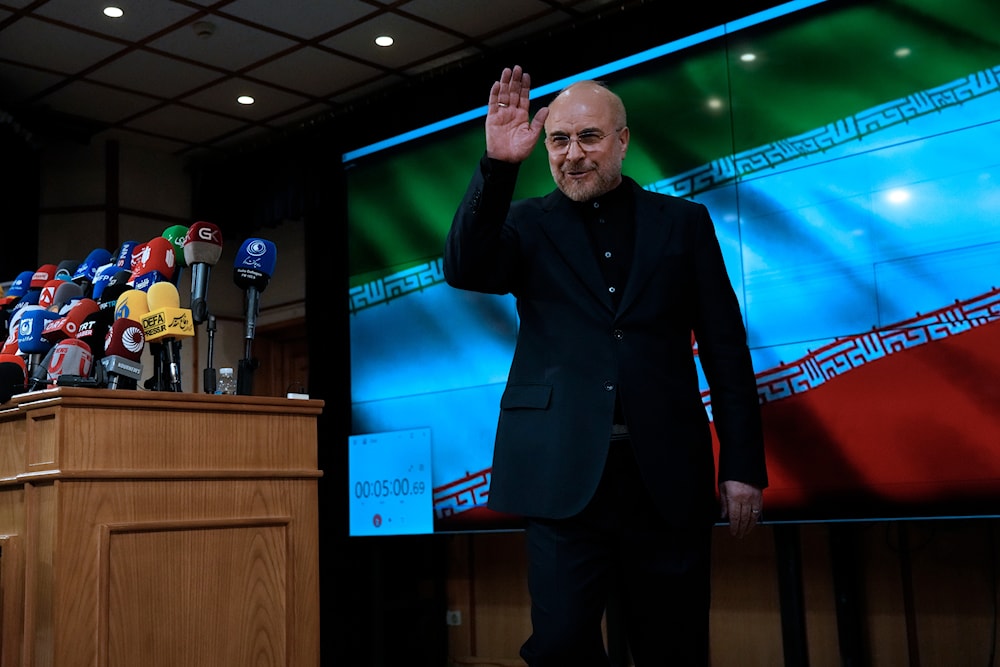First day of Iran presidential elections' televised roundtables
Candidates in Iran's upcoming June 28 snap presidential election are stepping up their campaigning efforts, engaging voters through televised appearances to emphasize their platforms and agendas.
-

Iranian Parliament speaker Mohammad Bagher Ghalibaf waves to the media at the conclusion of a press briefing after registering his name as a candidate for the June 28 presidential election at the Interior Ministry, in Tehran, Iran, on June 3, 2024. (AP)
Three presidential candidates participated in roundtable discussions broadcast by the Islamic Republic of Iran Broadcasting (IRIB) on Thursday, where they articulated their visions for the country across various sectors. These candidates are Masoud Pezeshkian, Mostafa Pour Mohammadi, and Mohammad Bagher Ghalibaf.
The roundtable discussions will proceed with these candidates and the remaining three, covering various topics such as politics, economics, and culture, until the launch of the presidential debates on Monday. The six presidential candidates, endorsed by the country's 12-member election supervisory body, have been setting forth their plans and visions during roundtable discussions broadcasted on state TV.
Pour Mohammadi roundtable debate
The first candidate to participate in the televised roundtable on Thursday was Pour Mohammadi, previously the minister of Interior Affairs (2005-2008) and the Justice Minister (2013-2017) of the Islamic Republic of Iran under different administrations. Pour Mohammadi's primary focus was on subjects concerning the country’s economy, foreign policy, relations with neighboring countries, and regional alliances.
He emphasized developing the country's economic interests, stressing the importance of prioritizing stability, security, and economic prosperity. Pour Mohammadi expressed his dedication to cultivating a prosperous society marked by improved material well-being and the pursuit of enduring happiness.
The candidate praised the progress achieved during the tenure of the late President Ebrahim Raisi in "cultivating international alliances," specifically highlighting the influence of BRICS and the Shanghai Cooperation Organization (SCO) in promoting Iran's national interests.
Pour Mohammadi emphasized the Palestinian cause as central to Iran's diplomatic efforts, highlighting the nation's commitment to freedom and autonomy in the region.
Ghalibaf's roundtable debate
Next in the televised roundtable discussion was Ghalibaf, the speaker of the Iranian Parliament and a senior lawmaker, focusing predominantly on cultural issues.
Ghalibaf emphasized the pivotal role of culture as a foundation of society, highlighting the need for advancements and progress in both cultural and social domains. He emphasized the interconnection between progress and cultural matters, noting the reciprocal impact between these two domains.
During his debate, Ghalibaf referred to the Iranian Leader, Seyyed Ali Khamenei's emphasis on economic issues, particularly in choosing the slogan of the year. He highlighted the significant impact of economic concerns on cultural affairs, illustrating the inseparable link between them.
As former Tehran Mayor, Ghalibaf underscored the pivotal role of women and family in shaping cultural dynamics, considering them fundamental topics in cultural discourse. He also stressed the importance of education and training, emphasizing the critical role of effective management and stability in enhancing educational outcomes.
Ghalibaf emphasized the importance of press freedom, describing the press as the voice of public opinion. He also expressed his ambition to empower youth to promote a culture of resilience through innovative platforms such as computer games.
Pezeshkian's roundtable debate
Masoud Pezeshkian, a former health minister, participated as the third candidate in Thursday's roundtable discussion, focusing prominently on economic issues.
Pezeshkian critiqued existing economic shortcomings and outlined his priorities for economic reform in the country. Drawing from a letter by Imam Ali ibn Abi Talib to his companion Malik al-Ashtar, he underscored the vital role of traders and business owners as the stable pillars of society.
He attributed past failures in achieving development plan objectives to insufficient adherence to requirements and advocated for the utilization of experts to rectify these shortcomings. Pezeshkian proposed a comprehensive approach involving domestic expertise, foreign advisors, collective wisdom, and scientific solutions to achieve specific national goals.
To attend to these objectives, Pezeshkian emphasized the necessity of adjusting regulations to align with national goals and promoting stress-free foreign relations. He referenced directives from Iran's leadership promoting joint investments with non-conflicting countries.
Furthermore, he highlighted the potential of the “digital economy” to grow amid imposed sanctions, adding the significance of “diplomatic language and tension reduction,” per the country's general policies.

 4 Min Read
4 Min Read








